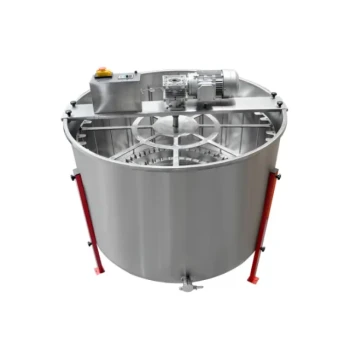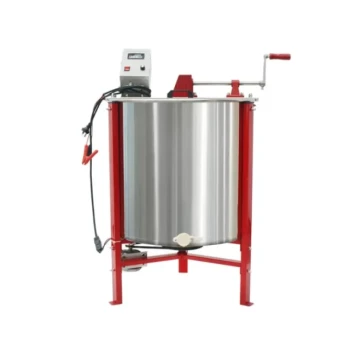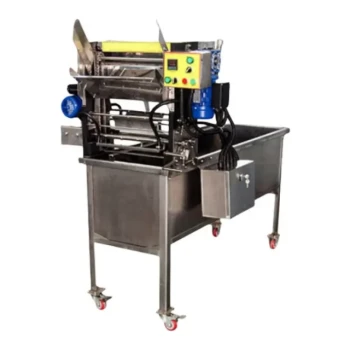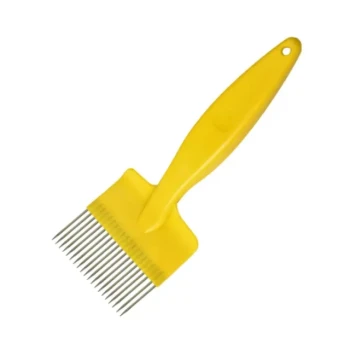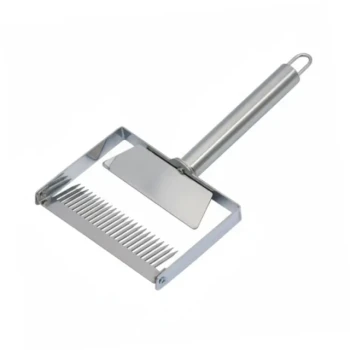Extracting honey is a rewarding process that transforms the bees' hard work into a product ready for your table. The core steps involve removing the honey frames (called supers) from the hive, carefully uncapping the wax-sealed cells, using centrifugal force to spin the honey out of the comb, and finally, filtering the honey to prepare it for storage.
The central goal of honey extraction is not simply to get the honey, but to do so efficiently while preserving the drawn-out comb for the bees. This saves the colony an immense amount of energy on the next honey flow, leading to a healthier and more productive hive.
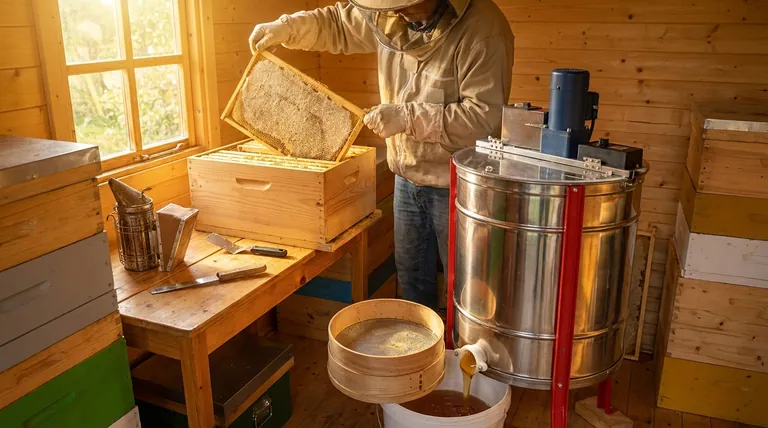
Phase 1: Preparing for the Harvest
Proper preparation is the most critical phase for a smooth and successful honey extraction. It ensures the bees remain calm and the honey stays clean.
Assembling Your Essential Toolkit
Before you approach the hive, have every tool clean and ready. You will need a hive tool to pry frames apart, a smoker to calm the bees, and a bee brush or blower to gently remove any remaining bees from the frames.
For the extraction itself, you'll need an uncapping tool (like a heated knife or fork), a honey extractor, and a filtration system (such as a double sieve) that fits over a food-grade bucket.
Selecting the Right Frames
The best time to harvest is when the bees have finished their work. Look for frames where at least 80% of the honeycomb cells are "capped" with a fresh layer of white beeswax. This capping signifies the honey has been dehydrated to the proper moisture content and is ready for long-term storage.
Clearing Bees from the Honey Supers
Your first hands-on task is to separate the bees from the honey you intend to harvest. The most common method is to use a bee escape board, a one-way door placed between the honey supers and the brood box 24 hours before extraction. This allows the bees to move down into the hive but prevents them from coming back up.
Alternatively, you can take each frame out individually and use a bee brush to gently sweep the bees off the comb and back into the hive.
Phase 2: The Extraction Process
Once you have your bee-free frames, move them to a clean, sealed indoor space (like a kitchen or "honey house") to prevent other bees from being attracted to the honey.
Uncapping the Honeycomb
This is the first step of the actual extraction. You must remove the wax cappings that seal the honey into the cells.
Use a heated uncapping knife or a specialized uncapping fork to carefully slice or lift off this top layer of wax. Let the cappings fall into a draining tray to collect any honey that drips off.
Spinning Out the Honey
Place the uncapped frames into the slots of a honey extractor. This device uses centrifugal force to sling the honey out of the cells without destroying the comb.
Start spinning slowly and gradually increase the speed. If you are using a tangential extractor, you will need to spin one side, flip the frames, and then spin the other side to extract all the honey.
Filtering and Straining
Once extracted, the honey will contain small bits of wax and other hive debris. Position a double sieve or several layers of cheesecloth over a clean, food-grade bucket.
Pour the honey from the extractor through the filter. The mesh will catch the wax cappings and other particles, leaving you with clean, pure honey.
Settling and Clarifying
After straining, it's best to let the honey sit in a covered bucket for a day or two. This allows any remaining fine particles and air bubbles to rise to the top, forming a thin layer you can easily skim off before bottling.
Understanding the Trade-offs: Alternative Methods
While using an extractor is the most common method, it isn't the only option. Your choice depends on your budget, goals, and the number of hives you manage.
The Extractor Method
This is the gold standard for beekeepers who want to maximize hive productivity. By preserving the comb, it saves the bees the significant time and resources required to build new wax, allowing them to focus on gathering more nectar. The main drawback is the initial cost of the equipment.
The Crush and Strain Method
For those without an extractor, this method is a simple alternative. You simply crush the entire comb in a bucket and then strain the resulting mix of honey and wax through a filter. It requires minimal equipment but destroys the comb, forcing the bees to rebuild it from scratch.
The Cut Comb Method
This isn't a method for producing liquid honey. Instead, you cut a perfect section of capped honeycomb directly from the frame and package it as-is. This creates a premium, natural product but yields less liquid honey overall.
Making the Right Choice for Your Goal
Your approach should align directly with your beekeeping philosophy and resources.
- If your primary focus is long-term hive health and efficiency: Invest in an extractor to preserve the bees' comb and energy.
- If you are a new beekeeper with a small budget: The crush and strain method is a perfectly acceptable starting point that requires minimal specialized equipment.
- If you want to create a premium, specialty product: The cut comb method offers a unique honey experience that many customers value highly.
Following these steps ensures a successful harvest that respects both the bees' incredible work and the high-quality honey they produce.
Summary Table:
| Extraction Method | Best For | Key Advantage | Key Drawback |
|---|---|---|---|
| Extractor Method | Commercial apiaries & serious beekeepers | Preserves comb for bee efficiency | Higher initial equipment cost |
| Crush & Strain | Beginners & small-scale beekeepers | Low equipment cost & simplicity | Destroys honeycomb |
| Cut Comb | Premium product producers | Creates unique, natural honeycomb product | Yields less liquid honey |
Ready to Scale Your Honey Harvesting Operation?
HONESTBEE supplies commercial apiaries and beekeeping equipment distributors with professional-grade extraction equipment that maximizes efficiency and preserves comb health. Our wholesale-focused operations ensure you get reliable, durable equipment at competitive prices.
We help you:
- Increase honey yields with efficient extraction systems
- Maintain hive health through comb-preserving technology
- Scale your operation with commercial-grade equipment
- Reduce long-term costs with durable, reliable supplies
Contact our wholesale team today to discuss your commercial beekeeping equipment needs and receive personalized pricing.
Visual Guide
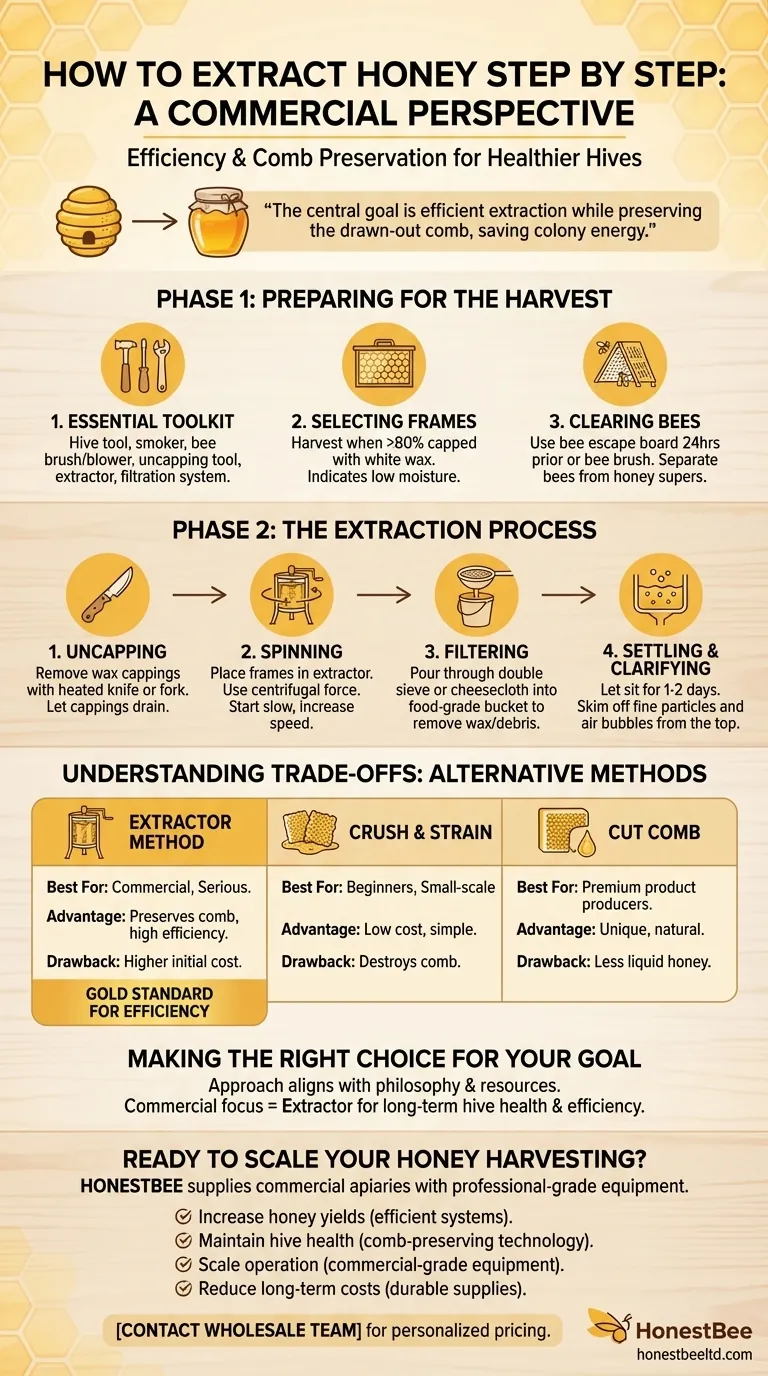
Related Products
- electric honey extractor honey centrifuge 3 frame honey extractor stainless steel honey frame extractor
- Electric 8 Frame Honey Spinner Extractor Equipment for Beekeeping
- 8-Frame Electric Self-Reversing Honey Extractor Spinner for Commercial Honey Extraction Equipment
- 40 Frame Commercial Electric Honey Extractor for Beekeeping
- 2 Frame Stainless Steel Manual Honey Spinner Extractor for Beekeeping
People Also Ask
- What is the step-by-step guide for honey extraction with a centrifuge? Maximize Efficiency with Ease
- What is the basic principle of the honey extractor? Harness Centrifugal Force for Efficient Harvesting
- What advantages does a centrifugal honey extractor offer over traditional pressing methods? Unlock Superior Honey Purity
- What are the core advantages of centrifugal automatic honey extractors? Maximize Yield and Preserve Your Honeycomb
- Can a centrifugal honey extractor be used with a top bar hive? Why the Crush and Strain Method is Your Best Bet



